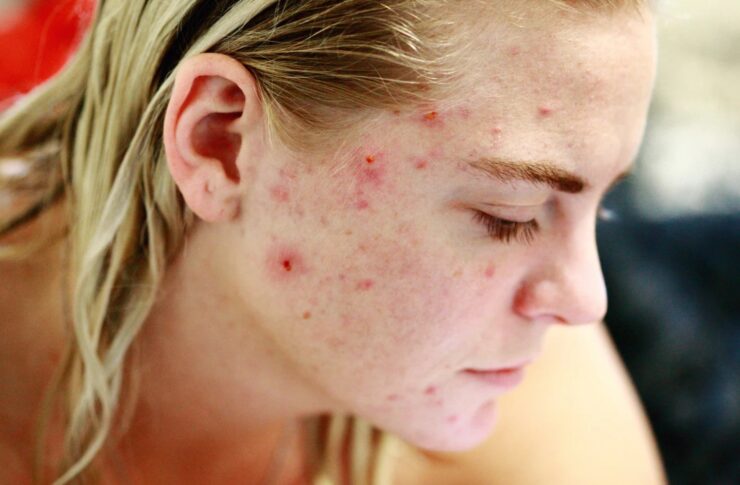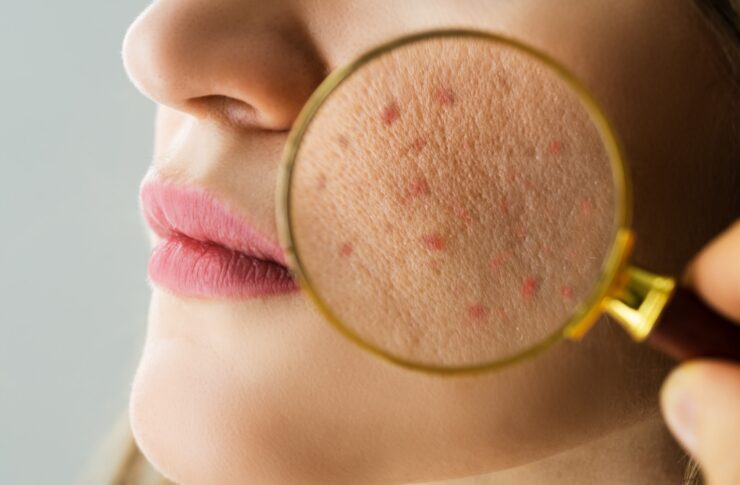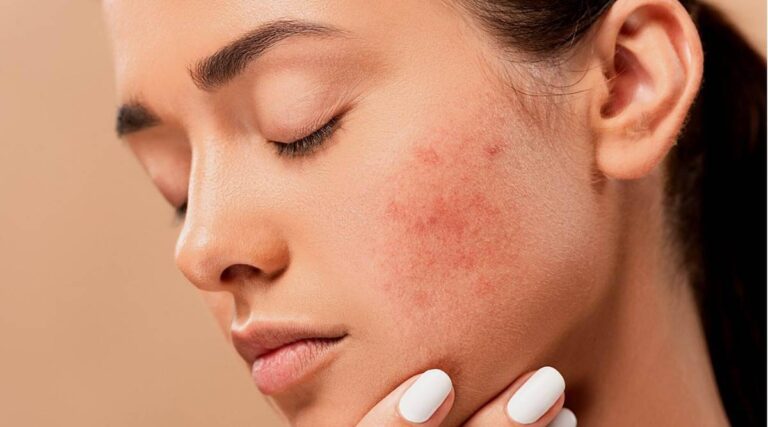Acne is a skin condition that plagues more than just teenagers. Many adults suffer from regular breakouts as well. While some cases of adult acne can be mild and easily treatable, others are much more severe and require medical intervention. So what causes adult acne?
And how do you permanently get rid of it?
In this article, we’ll discuss the top causes of adult acne breakouts and provide tips on how to clear them up in no time. Read on to learn more about adult acne and how to eliminate it!
What Are the Main Causes of Adult Acne?
Several factors can contribute to adult acne breakouts. Hormone imbalances are among the most common causes, as fluctuations in hormone levels can trigger excess oil production and lead to clogged pores. Poor diet choices can also play a role, as certain foods can increase inflammation and lead to skin breakouts. And lastly, stress can be a significant factor, as it can throw off your body’s natural hormone balance and lead to an uptick in flights.
Luckily, there are several things you can do to help clear up your skin.
- First and foremost, it’s essential to maintain a healthy lifestyle by eating nutritious foods and staying hydrated.
- You should also limit your sugar intake, as too much sugar can cause inflammation and trigger breakouts.
- In addition, cleanse your face twice daily with a gentle cleanser that won’t strip your skin of its natural oils.
- And lastly, remember to moisturize! A good moisturizer will help keep your skin hydrated and free from breakouts.
If your acne persists despite lifestyle changes, seeking help from a dermatologist is essential. Your doctor can recommend topical creams or oral medications to help clear up your skin.

Hormonal Imbalance
A hormonal imbalance often causes adult acne. The most common cause of hormonal imbalance is an excess of androgen, the male hormone. Androgen levels can be increased by stress, certain medications, and polycystic ovary syndrome (PCOS). PCOS is a condition that causes an imbalance of the female hormones estrogen and progesterone. This can lead to irregular periods, weight gain, and insulin resistance.
Other causes of hormonal imbalance include hypothyroidism and Cushing’s syndrome. A hypothyroid thyroid gland produces insufficient thyroid hormone and is underactive. This can cause fatigue, weight gain, dry skin, and constipation. Cushing’s syndrome is a rare condition that occurs when you have high cortisol levels. Cortisol is released in response to stress and helps regulate metabolism, but too much cortisol can lead to weight gain, muscle weakness, osteoporosis, and other problems.
See your doctor if you experience hormonal imbalances. They can do a blood test to check your hormone levels and determine if they cause acne. If your doctor finds that you have a hormonal imbalance, they can prescribe medications to help regulate your hormones. They may also recommend lifestyle changes, such as reducing stress and getting regular exercise. Eating a healthy diet can also help balance hormone levels.
Poor Diet
A poor diet can be one of the leading causes of adult acne breakouts. Foods high in sugar, fat, and processed carbohydrates can cause inflammation in the body and lead to breakouts. Eating a healthy diet is one of the best ways to prevent and get rid of acne. Consume a lot of fresh produce, wholesome grains, and lean proteins. Steer clear of processed foods, fizzy drinks, and saturated fats.

Stress
Stress is another common cause of adult acne. Feeling overwhelmed or anxious, your body releases hormones that can trigger breakouts. Try to practice stress-reducing activities such as yoga, meditation, or deep breathing exercises to help reduce stress levels.
If you’re an adult struggling with acne, you’re not alone.
The American Academy of Dermatology estimates that 50 million people experience acne annually. And while acne is often considered a teenage problem, adults in their 20s, 30s, 40s, and beyond can all be affected.
Many factors can contribute to adult acne breakouts, but stress is one of the most common. When you’re under pressure, your body produces more stress hormone cortisol. This increases oil production and can lead to clogged pores and breakouts.
If stress triggers your acne, you can do a few things to help manage it:
- Practice relaxation techniques like yoga or meditation.
- Exercise regularly to release endorphins and reduce stress levels.
- Avoid touching your face or picking at pimples, which can aggravate the skin and cause further breakouts.
- Get plenty of restful sleep every night.
- Talk to a therapist or counselor if you struggle to manage stress alone.
Medications
Several different medications can cause adult acne. These include birth control pills, steroids, and certain anti-seizure drugs. If you are taking any of these medications, speak to your doctor about whether or not they could be the cause of your acne. They could recommend complementary medicine.
In addition, some acne medications can be used to treat adult acne. These include topical retinoids, antimicrobial lotions or gels, and antibiotics. Your doctor can advise you on the best course of treatment for your specific skin type.

Genetics
There are many causes of adult acne breakouts, but one of the most common is genetics. If you have a family history of acne, you are more likely to suffer from breakouts as an adult. You can do several things to help prevent and treat genetic acne.
- First, it is essential to understand what causes acne. If you know what triggers your breakouts, you can avoid them in the future. Common triggers include certain foods, stress, hormones, and cosmetics. Keep a journal of your outbreaks so you can identify your triggers and avoid them in the future.
- Second, use gentle cleansing products on your skin. Harsh cleansers can irritate your skin and make breakouts worse. To avoid clogged pores, look for products marked “non-comedogenic” or “oil-free.”
- Third, try using over-the-counter treatments containing benzoyl peroxide or salicylic acid. These ingredients can help dry up excess oil and kill bacteria that can cause breakouts. Apply these treatments directly to the affected areas after cleansing your face.
- Fourth, see a dermatologist if your acne is severe or does not respond to over-the-counter treatments. A dermatologist can prescribe stronger medications to help clear up your skin.
How to Get Rid of Adult Acne?
Acne, a skin condition, can affect people of all ages. Acne can affect adults, despite being most frequently linked to adolescence. There are many different causes of adult acne, but the most common include hormonal imbalances, stress, and certain medications.
Fortunately, CROs (Clinical Research Organizations) are at the forefront of developing effective treatments for this condition through clinical trials. These trials are crucial in determining the safety and efficacy of various treatments before making them available to the public. CROs are instrumental in facilitating these trials, ensuring strict guidelines and regulations conduct them. With the help of CROs, the future looks promising for developing safe and effective treatments for adult acne. If you are struggling with adult acne, there are several things you can do to get rid of it.
- First, it is essential to identify the underlying cause of your acne and then take steps to address it. For example, if hormones cause acne, you may need to talk to your doctor about taking birth control pills or other medication to regulate your hormones.
- If stress is the culprit, try yoga or meditation to help reduce stress levels.
- Finally, wash your face twice daily with a mild cleanser and use an oil-free moisturizer to keep your skin hydrated.
If you have tried these tips and are still struggling with adult acne, you may need to see a dermatologist for additional treatment options.

Conclusion
Adult acne is a prevalent skin condition that affects adults of all ages. Various factors, including hormonal imbalances, stress, poor diet, and bad skincare habits, can cause it. Fortunately, there are many ways to treat and prevent adult acne breakouts, such as eating a clean diet full of nutrient-rich foods, reducing stress levels through relaxation techniques or exercise, maintaining good hygiene practices such as washing your face twice daily with gentle cleansers and moisturizing afterward with natural oils like tea tree oil. You can soon have clear skin free from pimples with the right lifestyle changes and treatments!

